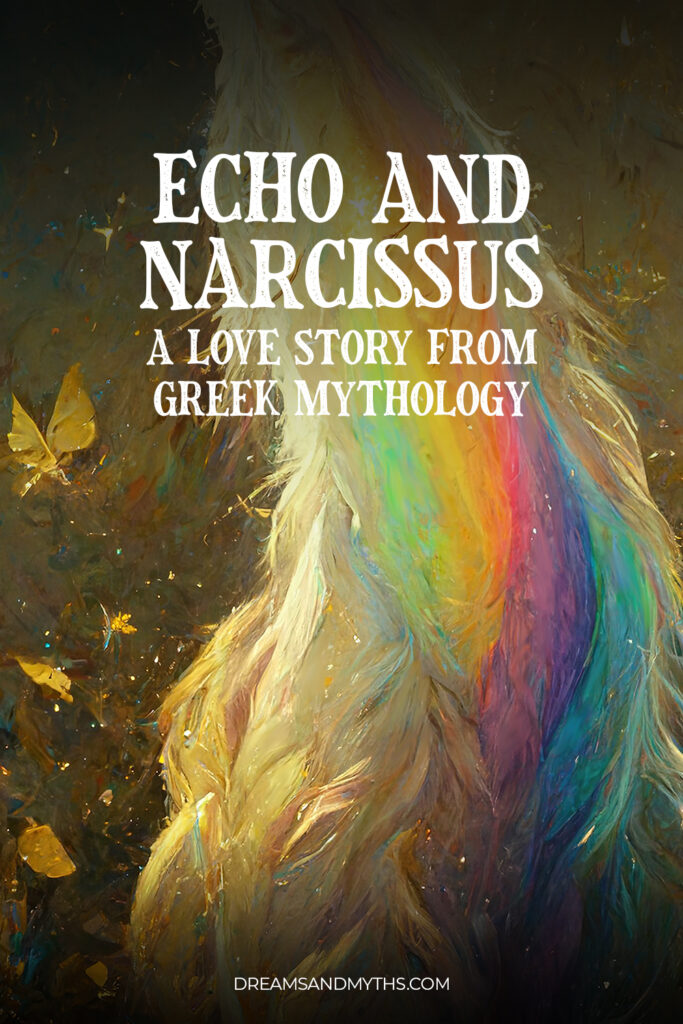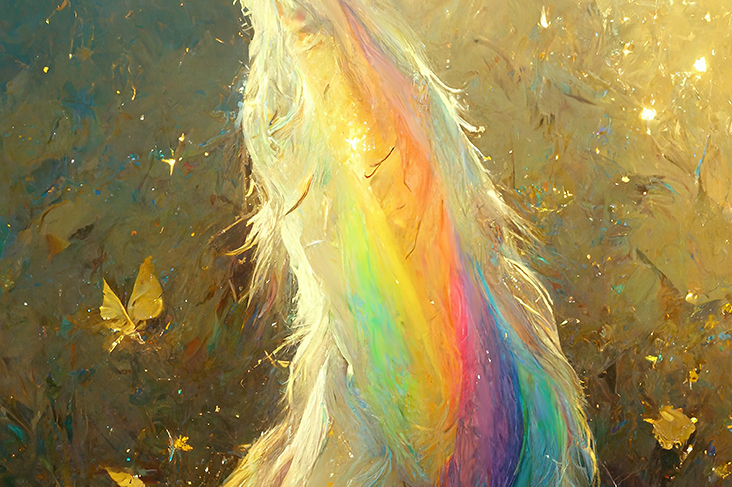The question is, where does love end? To what extent can it go? The story of Echo and Narcissus revolves around these questions. Both main characters in this tale learned the hard way that love can become intolerable if it isn’t reciprocated.
The story of Echo and Narcissus serves as a cautionary tale about the dark side of narcissism, which can manifest as unhealthy levels of infatuation with one’s own reflected glory. As Echo fell for Narcissus, the latter fell for himself. As passion morphed into fixation, hopelessness crept in.

One of the most well-known stories from Greek mythology, the tale of Echo and Narcissus, was told and replayed many times throughout antiquity. Ovid’s version of the myth of Narcissus and Echo is frequently cited. However, there are other variations.
Echo and Narcissus is, at its core, a story about self-love and unrequited love. Keep reading to know more about this love story.
Who is Narcissus?
Legend has it that the River god Cephissus of Boeotia and the nymph Liriope had a handsome son named Narcissus.
The young hunter who would become known as Narcissus was from the town of Thespiae in the Greek region of Boeotia. The handsome offspring of a river deity and a nymph was the object of adulation all over ancient Greece.
Along with Adonis, Ganymede, and Hermaphrodite, he is ranked among the most handsome young males.
As you’ve already guessed, though, Narcissus was a bit of a narcissist. The only person he could love was himself; he could not feel love for anyone else. As a result, he had no shortage of male and female admirers.
No one else was as attractive to him as he was. Therefore he couldn’t imagine falling in love.
Because of this, many individuals will be disappointed in your decision to reject them. Trouble begins when they begin pleading with the gods to punish you, as transpired with Narcissus.
Who is Echo?
Echo, a nymph, was one of Narcissus’s suitors; in the end, she gave her all to her love for him.
Echo was a nymph of the Oread tribe, native to Boeotia’s Mount Cithaeron. The mountain nymph’s parents remain a mystery, although it is known that the Younger Muses were responsible for her musical upbringing.
Echo, a stunning mountain nymph, was pursued by both Apollo and Pan, but she consistently rejected their approaches. Despite this, Zeus nonetheless enlisted Echo’s services.
For a while, Zeus had his way with other nymphs, Echo would chat with Hera for hours, keeping the goddess preoccupied and thereby covering for Zeus’ infidelities.
When Hera realized that Echo was aiding Zeus in his dealings, she cursed the nymph such that she could no longer speak on her behalf and could only repeat what others said.
Echo And Narcissus
Hera had condemned Echo to wander the earth until she found Boeotia, where she beheld the stunning Narcissus. After failing to call out to Narcissus, Echo would retreat into the bushes and watch him from a distance.
A day would come, however, when Narcissus would become aware of Echo’s existence, and the two would finally meet. However, after that, Narcissus treats Echo with the same disdain with which he treats everyone else: by ignoring her.
Echo’s love for Narcissus was so strong that if she were to be rejected, she would gradually disappear until only her voice remained.
Echo met Narcissus by chance one day while exploring the forest, and the two were quickly smitten with one another. She followed him stealthily so as not to alert him to her presence, but when he heard a rustle in the bushes, he turned and said, “who’s there?”
She echoed his words, and Narcissus interpreted that to be the sound of his voice reverberating through the woods and went on his way.
When Echo had watched them for a while, her growing excitement had forced her out of hiding. She came forward and embraced Narcissus, the point at which most love stories would have them kiss and embrace and blah blah blah.
He cut off her arm and instructed her to leave him alone. That’s why he’d never find someone he could love who was like her, or more precisely, who he couldn’t love because they weren’t himself.
There she would remain, lonely and broken-hearted, for the rest of her life, until eventually she disappeared into the forest and was replaced by an echo.
Narcissus And Ameinias
As the story goes, Echo wasn’t the only one who had their feelings for Narcissus rejected; another unfortunate young man named Ameinias was also deeply in love with him but was also rejected.
After taking the news of his rejection as seriously as humanly could, Ameinias would hang himself with the sword that Narcissus had given him at the entrance to his home.
One version of the story has Ameinias praying to the gods for vengeance against Narcissus, while another has one of the many spurned nymphs appealing.
The Punishment of Narcissus
After observing Narcissus, the goddess Nemesis concluded that his actions were suspicious. When she learned what had happened to Echo, she believed it was about time that this kind of behavior was censured.
In the early hours of one morning, while out hunting, Narcissus spotted something out in the distance. A pool of water was Nemesis’s way of drawing him in. He bent down to drink some water, depleted from the quest.
As soon as Narcissus laid eyes on the most beautiful creature he had ever seen, floating in the pool of water, he, too fell hopelessly in love.
He looked at himself in the mirror until he realized his sentiments were unrequited. Naturally, he was staring at none other than his own reflection. It was someone else totally to him. Surprised as he was, he just couldn’t bring himself to leave.
Now, he supposedly knew what it was like to love a person who would never return your love.
Because of his guilt and anguish, he took his own life, and his blood pooled to become a beautiful white and gold flower.
Also Read: The Quintessential Hero, Heracles
Moral of The Story
No matter how often a story is retold, the lessons and themes always stay the same. At its most fundamental level, it’s a stark warning to anyone with an unhealthy preoccupation with their appearance.
What you see in the mirror isn’t all there is. If you let your pride and ego get the best of you, you can miss the forest for the trees.
More than that, it’s a cautionary tale about the importance of considering the consequences of one’s actions on others around them. When rejected, Narcissus displays little consideration for his suitors’ feelings.
When he experiences something similar, he realizes the gravity of the issue. The emotional volatility of youth is the essential conclusion of this story.
However, Narcissus is usually referred to as a kid, which indicates that he was in his mid-teens when people tend to make many mistakes as they continue to develop into adulthood.
It’s also not unusual for a boy his age to be a little self-centered and fixated on his appearance. To his credit, Narcissus shows signs of growing up and learning that his acts will have repercussions. Nothing changes the fact that he’s a flower now.
In other words, the story can be interpreted in numerous ways. Naturally, some are more useful than others.
The Bottom Line
Symbolizing the two poles of human nature, the fable of Echo and Narcissus serves as a warning tale.
Ultimately, Narcissus’s narcissism leads to his death because he is transfixed by his reflection and cannot bear to look away.
Echo, unable to express her needs, becomes obsessed with Narcissus despite his rejection.
While seemingly simplistic, this old tale might actually capture the essence of modern narcissism and co-dependency.
